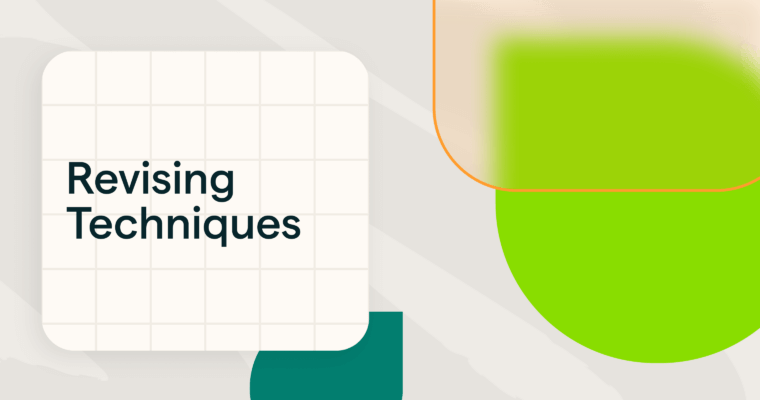
Spring has sprung, and it’s time to tidy up your writing.
We asked our fans for their best advice for editing their work and received well over a hundred responses. Here are ten of our favorites.
1 Read backwards.
Grammarly Facebook fan Alice Anne Kroehling Hall recommends reading backward to catch spelling errors. Her tip has a lot of support from the rest of the Grammarly community!
“Our eyes tend to see what the brain expects,” says Alice. “Reading out of order prevents that.”
To read backward, simply read one word at a time from the end of the paragraph to the beginning in reverse order. Spelling mistakes will show themselves.
2 Don’t rely too heavily on your word processor’s spellchecker.
Don’t rely too heavily on computer spell-checking. Computers don’t understand context. They’re, their, there – all the fine to a computer.
— Barb Olson (@CanadianXwords) March 15, 2018
Spellcheck will only take you so far. Let’s say you’ve emailed your boss that the meeting location isn’t ideal but the team will “grin and bare it.” You may have spelled “bare” correctly, but using the wrong homophone means you’ve just suggested some completely inappropriate meeting attire.
3 Read it out loud.
Bev MacAdam Wilkes told our Facebook fans that “Reading out loud is key. Your mind may move too fast when reading silently, but when content is read aloud, it’s amazing how much can be heard and simplified. Also, verb tense errors become glaringly apparent.”
The University of North Carolina Writing Center agrees and suggests these strategies for making reading out loud more effective:
- Try working from a printed copy. This will allow you to make marks at places where something sounds wrong to you so you can return to them later.
- As you read, follow along with your finger, pointing at each word. This can help you stay focused and not skip anything.
- Try to read at a moderate pace.
- If you are proofreading, consider reading your paper out loud one sentence at a time, starting at the end and working back to the beginning. This will help you focus on the structure of each sentence, rather than on the overall flow of your argument.
- Try covering up everything but the section or sentence you are working on at the moment so you can concentrate on it and not get lost.
4 Have someone else help edit.
If you’re lucky enough to have someone who can read and help you find mistakes in your work, make sure you show proper gratitude whenever they give you a hand—friends who edit are invaluable! (You might even consider writing them a letter of appreciation.)
—Noelle Bonjour, FacebookI prefer to let someone else edit for me. My brain is too good at ‘correcting’ when reading my own writing, meaning more often than not, I will read what I meant to write as opposed to what I actually wrote. That’s why I like to turn to someone on my short list of potential editors.
5 Let it sit.
“I let things sit for a few days to a week, then reread. Mistakes are easy to spot then,” said Nan Fischer on Facebook.
Many of our Facebook fans suggested waiting before jumping into the editing process. We agree—it works! Your brain needs a break to switch gears from writing to editing mode, so let your draft sit for a while before you begin to edit.
RELATED: 24 Quick Tips That Will Improve Your Writing
6 Edit in multiple rounds.
Katie Hartlove on Facebook said, “You need at least two rounds of editing. One for the big, ‘higher’ concerns. For example, what is missing? Who is the target audience, and is it written with them in mind? In nonfiction, does the thesis match the paper?
“Then you need an edit for ‘lower’ concerns, such as grammar, spelling, punctuation. You can fix your grammar night and day, but ultimately if you haven’t fixed the big stuff, you’ll have to keep fixing the small stuff over and over.”
Your #texting fails could cost your business money. ?
Here’s how: https://t.co/2xMSYC34eb
— Grammarly (@Grammarly) April 9, 2018
7 Get rid of the excess.
Facebook fan Valerie Jeanne Garber invoked William Strunk’s classic advice: omit unnecessary words. “My first draft is usually much wordier than it needs to be,” she said.
If you’re wondering what sorts of words to eliminate, start with our list of 31 words and phrases you no longer need as well as our tips for cleaning up your dirty, wordy writing.
8 Print it.
A number of our fans and followers suggested printing your work and even breaking out the red pen. Sometimes, stepping away from your computer with a printed document in hand can help you catch errors you might have missed when you were staring at your monitor.
9 Get the first sentence right.
No matter what you’re writing, the best way to get your writing read is to hook your reader with a great first sentence. Grammarly fan Beth Goehring says, “Make the first sentence sing. Make sure it’s bold and begs the reader to continue. Work on that the hardest. It pays off.”
10 Learn from your mistakes.
We all make mistakes. Sometimes those mistakes are more glaring than others.
—Elizabeth ChinHit Send. The moment you can’t take it back anymore, you’ll see everything that was wrong with it.
And hey, if your mistake is truly heinous, we can help you write a great apology letter!
![]()






